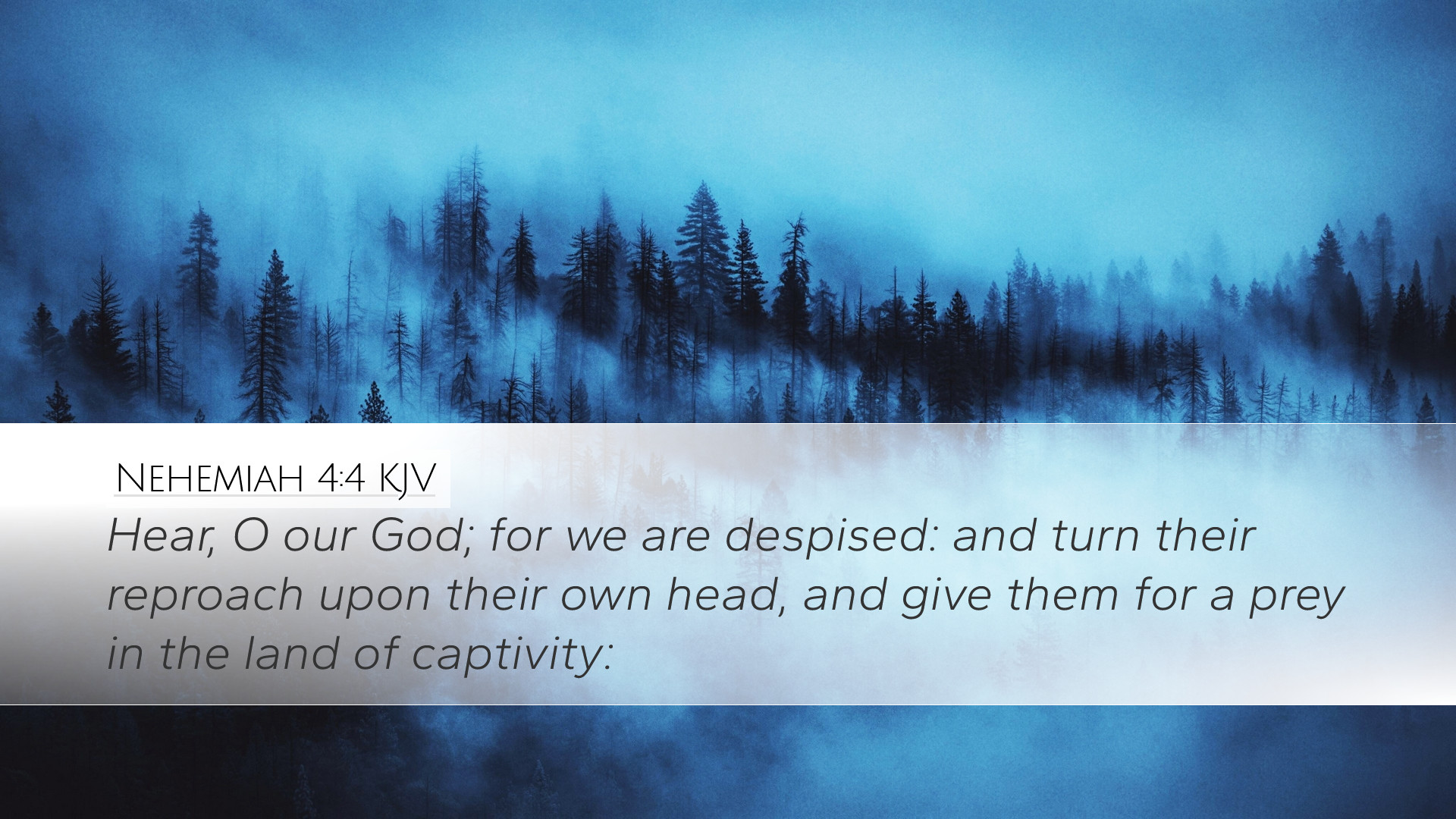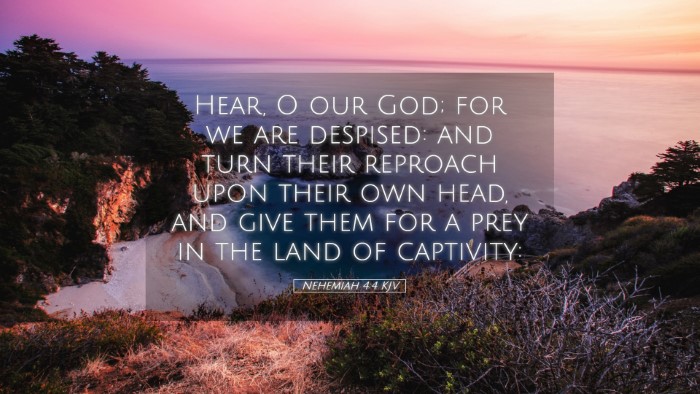Commentary on Nehemiah 4:4
Nehemiah 4:4 states, "Hear, O our God; for we are despised: and turn their reproach upon their own head, and give them for a prey in the land of captivity." This verse embodies a pivotal moment of prayer in Nehemiah's narrative, revealing his reliance on God amid opposition.
Contextual Background
The book of Nehemiah captures the critical phases of the rebuilding of Jerusalem's walls after the Babylonian exile. This specific verse occurs in a section where Nehemiah and the Jewish people faced significant hostility from surrounding adversaries, including Samaritans and Ammonites. The emotional and spiritual tactics employed by the enemies were both direct mockery and a broader campaign of slander.
Insights from Matthew Henry
Matthew Henry offers profound insights into this passage, emphasizing the deepest aspects of Nehemiah's prayer. His commentary indicates that this prayer reflects a heart grieved not only by personal suffering but by the dishonor done to God’s name through the reproach of His people.
- Desperation in Prayer: Nehemiah's cry reveals a sense of urgency. Henry notes, "Prayers that are offered in a time of trouble often have a special fervency." This prayer is not merely a request for deliverance but a plea for God’s justice.
- Divine Deliverance: The phrase "turn their reproach upon their own head" underscores a theme of divine reversal. God’s people trust in His justice to defend them against their oppressors. This is an assertion of faith that God will vindicate them.
Reflections from Albert Barnes
Albert Barnes provides a thorough examination of the implications of this verse in relation to the character of God. He underscores the significance of invoking God's name in prayer during times of despair.
- Theological Reflection: Barnes points out that Nehemiah's appeal to God’s character is crucial: "O our God." It emphasizes not only a collective plea but also serves as a reminder of God's covenant relationship with His people.
- Judgment on Oppressors: In recasting the reproach upon the heads of adversaries, Barnes articulates a belief in the natural justice of God – adversaries will reap the consequences of their actions. This is a call for God’s sovereign intervention.
Adam Clarke’s Interpretation
Adam Clarke’s commentary adds depth to the understanding of Nehemiah’s lament by situating it within a broader biblical framework. Clarke emphasizes the cultural and historical aspects of the prayer.
- Cultural Context: Clarke notes that the enemies were not merely individuals but represented a broader cultural hostility against the Jewish people. Their tactics were designed to instill fear and promote despondency among the builders.
- Spiritual Warfare: Clarke frames this moment as not just a physical struggle but a spiritual confrontation. He opines that Nehemiah recognized the spiritual dimensions of the conflict, emphasizing the need for God’s involvement at every level.
Application for Pastors and Theologians
Nehemiah 4:4 serves as a rich texture for pastoral reflection, especially in times of congregational distress. There are several applications that can be drawn from this text:
- Prayer as a Response to Adversity: The urgent nature of Nehemiah’s prayer is instructive. Pastors can encourage congregations to turn to prayer as a first response in times of opposition, emphasizing dependence on God rather than self-reliance.
- Covenant Community: The invocation of "our God" speaks to the importance of community in prayer. The church must unite in beseeching God for help, highlighting the shared identity and solidarity among believers.
- Understanding Reproach: Followers of Christ often face mockery and opposition, just as Nehemiah did. Recognizing that such reproach is a part of faith can help believers navigate struggles with a more significant resolve.
- Justice and Deliverance: The assurance of divine justice can empower believers to remain steadfast. They can trust that God sees their plight and works towards justice, much as He did in Nehemiah’s time.
Theological Themes
Various theological themes can be extracted from this poignant verse:
- The Sovereignty of God: This text underscores God’s ultimate authority and sovereignty over all circumstances, affirming that He is aware of and responsive to the suffering of His people.
- Divine Justice: Nehemiah’s plea illustrates the biblical principle of retribution, where God later acts in accordance with justice against those who oppress the faithful.
- The Nature of Fellowship with God: Nehemiah’s candid dialogue with God showcases the importance of honest communication in prayer, particularly in expressing distress and seeking intervention.
Conclusion
Nehemiah 4:4 encapsulates the essence of faith during trials, challenging both historical and contemporary believers to trust in God's ultimate justice and to seek His aid earnestly in prayer. The insights from public domain commentaries enrich our understanding, reflecting upon the depth of human emotion in relation to divine sovereignty.


